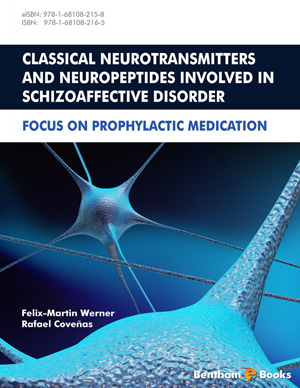Abstract
Here, we describe the alterations of classical neurotransmitters and neuropeptides, acting at specific subreceptors, in the brain regions involved in affective and schizophrenic symptoms in the schizoaffective disorder. In schizophrenic symptoms, alterations of the postsynaptic excitatory neurotransmitters dopamine and serotonin and hypoactivity of the presynaptic inhibitory neurotransmitter GABA and of glutamate occur in the mesolimbic system, hippocampus and prefrontal cortex. Neuropeptides, such as neurotensin, cholecystokinin and substance P act as neuromodulators. In depressive symptoms, brain regions such as the brainstem, hypothalamus and hippocampus are involved. Serotonin, dopamine, acetylcholine, GABA and glutamate play an important role. Neuropeptides such as galanin, neuropeptide Y and substance P are involved in the pathophysiology of the affective symptoms. Because schizophrenic and affective symptoms can be enhanced by stressful events or traumatisms, the hypothalamic-adrenal axis and its efferent connections to the brainstem and hippocampus are considered. We suggest additional pharmacotherapies for the treatment of the disease interfering with specific subreceptors of the classical neurotransmitters and neuropeptides described.
Keywords: Acetylcholine, antipsychotic drug, brainstem, cholecystokinin, dopamine, galanin, gastrin-releasing peptide, gamma-aminobutyric acid, glutamate, hippocampus, hypothalamus, hypothalamic-adrenal axis, moodstabilizing drug, neural network, neuropeptide Y, neurotensin, prefrontal cortex, serotonin, tachykinin, ventral tegmental area.






















